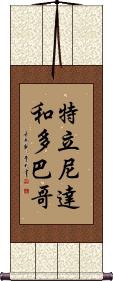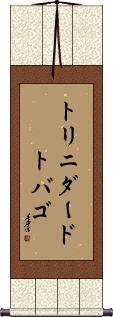The Name Trinidad And Tobago in Chinese/Japanese on a Personalized Wall Scroll.
Click the "Customize" button next to your name below to start your personalized Trinidad And Tobago calligraphy artwork...
Trinidad and Tobago
This is the Chinese name for the country of Trinidad and Tobago.
Definitions vary as to whether in North or South America.
See Also: North America | South America
Trinidad and Tobago
The following table may be helpful for those studying Chinese or Japanese...
| Title | Characters | Romaji (Romanized Japanese) | Various forms of Romanized Chinese | |
| Trinidad and Tobago | 特立尼達和多巴哥 特立尼达和多巴哥 | tè lì ní dá hé duō bā gē te4 li4 ni2 da2 he2 duo1 ba1 ge1 te li ni da he duo ba ge telinidaheduobage | t`e li ni ta ho to pa ko telinitahotopako te li ni ta ho to pa ko |
|
| Trinidad and Tobago | トリニダード・トバゴ | to ri ni daa do ・ to ba go torinidaado・tobago to ri ni da do ・ to ba go | ||
| In some entries above you will see that characters have different versions above and below a line. In these cases, the characters above the line are Traditional Chinese, while the ones below are Simplified Chinese. | ||||





